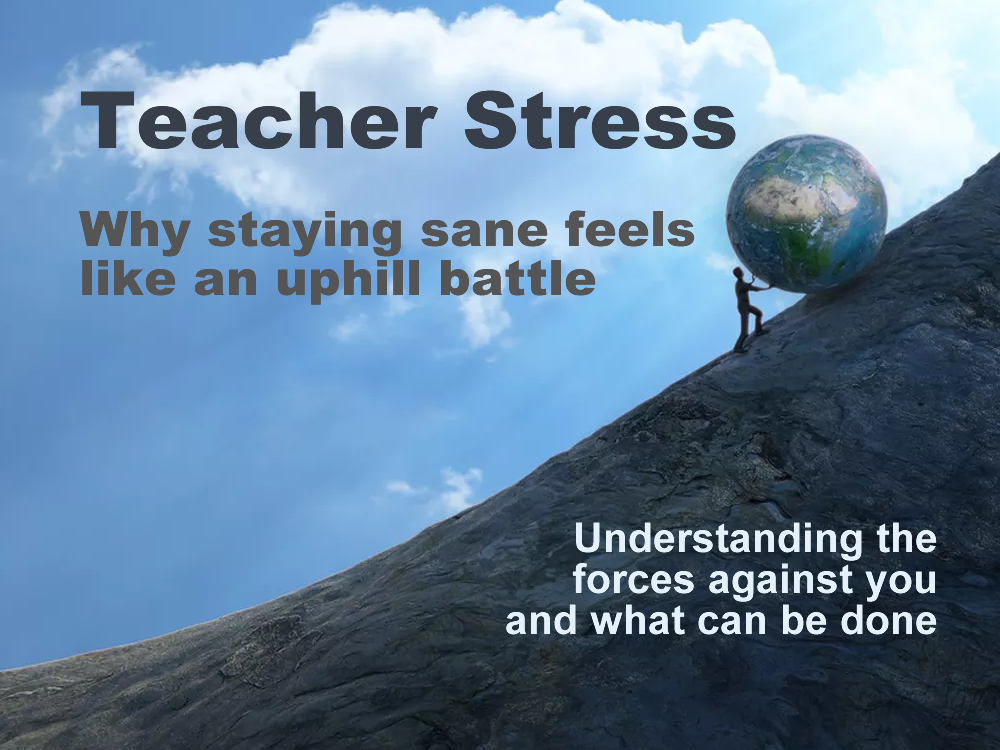Staying sane can feel like an uphill battle.What leads to this insanity?
And can anything be done to stop it? Educators struggle with stressors placed on them, their schools, and their students. We need to take a serious look at these negative forces before teachers see their only way to escape is to leave the profession.
|
Presentation Materials |
Understand how your emotions effect your well-being and relationships with others. An online self-assessment from Dr. Richard Davidson, the Center for Healthy Minds, University of Wisconsin-Madison. Results displayed at the end and can be emailed to you.
From CASEL, designed to help teachers and staff assess and understand their own levels of social and emotional competence.
23 Resilience Building Tools & ExercisesExcellent article with activities for adults and students to build resilience. Also information, videos, and links.
From Positive Psychology. Click for link How can we support the emotional well-being of teachers?Sydney Jenson, Nebraska Teacher of the Year, talks about stressors that challenge educators, including secondary trauma and compassion fatigue. Time- 11 minutes.
10 Tips to Deal with Stress & Building Resiliency
|
Truth with a little levityTeacher Stress, Effects on Students and Schools
Direct and with humor, Sarah Breckley--Wisconsin 2017 High School Teacher of the Year-- shares the research and the effect teacher stress is having on students, the classroom, and education. Time: 16:48 minutes Components of Self CareFrom Faculty of Medicine, University of British Columbia
Choose one from each of the five categories to actively work on. Physical self-care: Eat regularly (breakfast, lunch, and dinner) Get regular medical care for prevention Get massages Dance, swim, walk, run, play sports, sing, or do some other physical activity that is fun for you Take vacations Wear clothes you like Get enough sleep Psychological self-care: Make time for self-reflection Write in a journal Read literature that is unrelated to work Engage your intelligence in a new area, e.g.: go to an art museum, history exhibit, sports event, theatre Practice receiving from others Notice your inner experiences – listen to your thoughts, judgments, beliefs, attitudes and feelings Say “no” to extra responsibilities sometimes Emotional self-care: Spend time with others whose company you enjoy Stay in contact with important people in your life Give yourself affirmations, praise yourself Allow yourself to cry Play with children Identify comforting activities, objects, people, relationships, places and seek them out Spiritual self-care: Spend time in nature Find a spiritual connection or community Cherish your optimism and hope Be aware of non material aspects of life Be open to not knowing Meditate Pray Sing Take in inspirational content (literature, talks, etc.) Workplace or professional self-care: Take a break during the workday (e.g. to eat) Take time to chat with colleagues Make quiet time to complete tasks Have a peer support group Set limits with colleagues Identify projects or tasks that are exciting and rewarding Regularly consult with a mentor |
|
|
APA Teacher Stress ModuleThe first few years in the classroom can be the most difficult for a new teacher who may feel overwhelmed by the complexity and responsibilities of his or her new role. This module, primarily aimed at pre-service teachers and new educators, examines definitions and causes of teacher-related stress and provides strategies for recognizing, preventing and coping with stressful situations, events and triggers as they occur.
Time: 1 hour, 21 minutes |
Teacher Stress and Health: Effects on Teachers, Students, and SchoolsProduced by the Robert Wood Johnson Foundation
Brief overview of the effect teacher stress is having on education as a whole. Time: 2:27 minutes |
|
